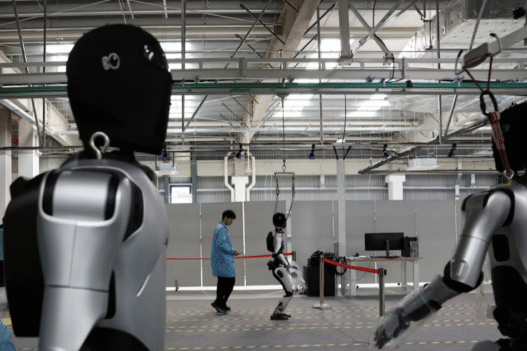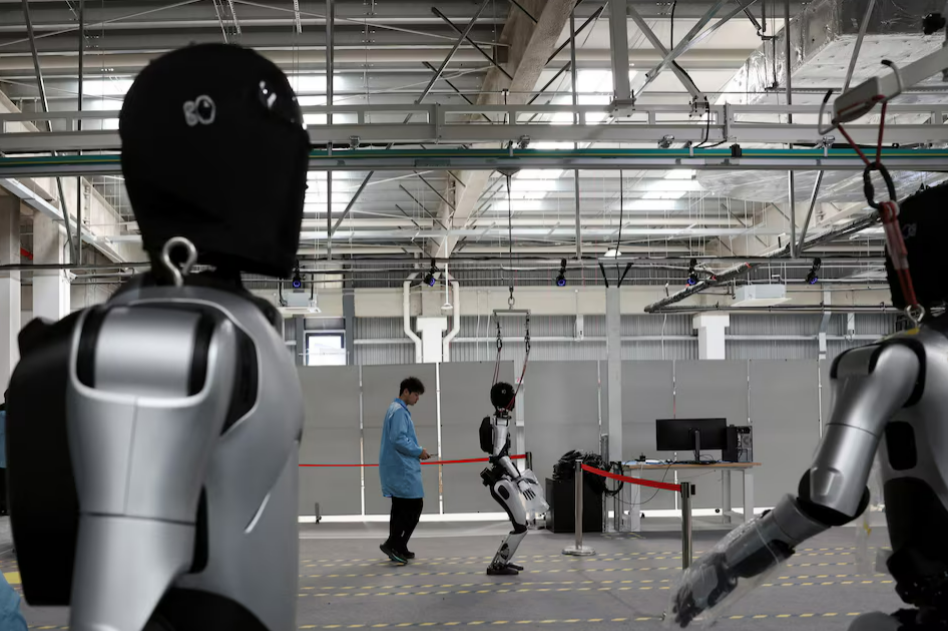In a spacious warehouse on the outskirts of Shanghai, humanoid robots work tirelessly for 17 hours daily. They perfect skills like folding T-shirts, making sandwiches, and opening doors.
This facility, owned by Chinese startup AgiBot, generates vital training data. The goal is to develop robots intended to revolutionize how humans live and work.
“Just imagine that one day in our own robot factory, our robots are assembling themselves,” said Yao Maoqing, an AgiBot partner.
Strategic National Priority
The strategic importance of humanoid robots to Beijing was highlighted when President Xi Jinping personally inspected AgiBot’s robots last month.
Xi’s lighthearted suggestion that the machines might play football underscored their significance to China’s economic future.
As trade tensions with the United States continue to evolve, China is positioning itself for a new industrial revolution. This revolution envisions humanoid robots performing many factory tasks.
This initiative comes as China faces pressing challenges including population decline and slowing economic growth.
AI Advancements Drive Progress
Chinese humanoid robots have demonstrated remarkable physical capabilities, from performing somersaults to running half-marathons.
However, the real breakthrough lies in combining this impressive hardware with sophisticated AI software. This marriage creates economically valuable machines.
Advancements in artificial intelligence are driving progress. These advances come from homegrown companies like DeepSeek and substantial government backing.
Together, they’re enabling these robots to evolve from novelties into productive workers. This transformation could reshape the world’s manufacturing landscape.
Government Investment Powers Growth
Chinese authorities are fueling the sector with massive investments. Over $20 billion has been allocated to humanoid development in the past year alone.
Beijing is establishing a one trillion yuan ($137 billion) fund to support startups in AI and robotics.
The government is both investor and customer. State procurement of humanoid robots surged from 4.7 million yuan in 2023 to 214 million yuan in 2024.
Additional support includes:
- A 10 billion yuan AI and robotics fund in Shenzhen
- Subsidies up to 5 million yuan for Wuhan-based robot makers
- Up to 30 million yuan from Beijing’s municipal government fund
Many analysts predict humanoids will follow electric vehicles’ trajectory. They expect costs to drop dramatically as manufacturers enter the market and government subsidies drive adoption.
“With its comprehensive supply chain, China has an edge in lowering the humanoid robot production cost significantly,” said Ming Hsun Lee of Bank of America Securities.
Lee predicts that global annual sales could reach 1 million units by 2030.
Data Collection: China’s Advantage
The Chinese government is heavily investing in data collection. This represents both the industry’s primary challenge and an area where China claims significant advantages.
Unlike generative AI, which trains on vast online datasets, humanoid robots require specialized data. This data focuses on physical tasks like stacking boxes or pouring water.
Shanghai authorities have established AgiBot’s data collection site rent-free. Here, approximately 100 robots operated by 200 humans work daily to generate this crucial training data.
Similar facilities are under construction in Beijing and Shenzhen, according to official announcements.
From Prototypes to Production Lines
Chinese startups are progressing rapidly from development to deployment. MagicLab has begun implementing prototypes in production lines for various tasks.
These include quality inspection, material handling, and assembly operations.
“These breakthroughs lay the foundation for our focus in 2025 on real-world applications,” said CEO Wu Changzheng.
Wu noted that MagicLab integrates its robots with AI models from DeepSeek, Alibaba’s Qwen, and ByteDance’s Doubao.
China’s dominance in hardware manufacturing presents another advantage. The country is capable of producing up to 90% of humanoid components.
This has lowered barriers to entry and sparked an explosion of new firms. In 2024 alone, 31 Chinese companies unveiled 36 humanoid models, compared to just eight from U.S. companies.
At least six Chinese companies have entered or are preparing for mass production this year. These include market leaders Unitree and UBTech.
Some Chinese startups now offer humanoids for as little as 88,000 yuan ($12,178).
Addressing Workforce Concerns
As the technology advances, Chinese lawmakers are beginning to address potential workforce implications. With approximately 123 million people employed in manufacturing, the impact could be substantial.
At this year’s National People’s Congress, social security expert Zheng Gongcheng warned of widespread effects. He noted that robots and AI could affect around 70% of China’s manufacturing sector.
Liu Qingfeng, chairman of AI firm iFlytek, proposed creating an AI unemployment insurance program. This would offer 6-12 months of coverage for displaced workers.
Despite these concerns, Beijing views humanoid robots as essential for addressing labor shortages. This is particularly important in elderly care as China’s 1.4 billion population ages.
The government’s national elderly-care plan explicitly encourages integrating humanoid robots and AI technologies.
“The robots in five or ten years could organize a resident’s room, pick up a package or even transfer people from a bed to a washroom,” predicted AgiBot’s Yao.
Read more about tech innovations at 1st News 24 for the latest updates on how technology is transforming industries worldwide.





















